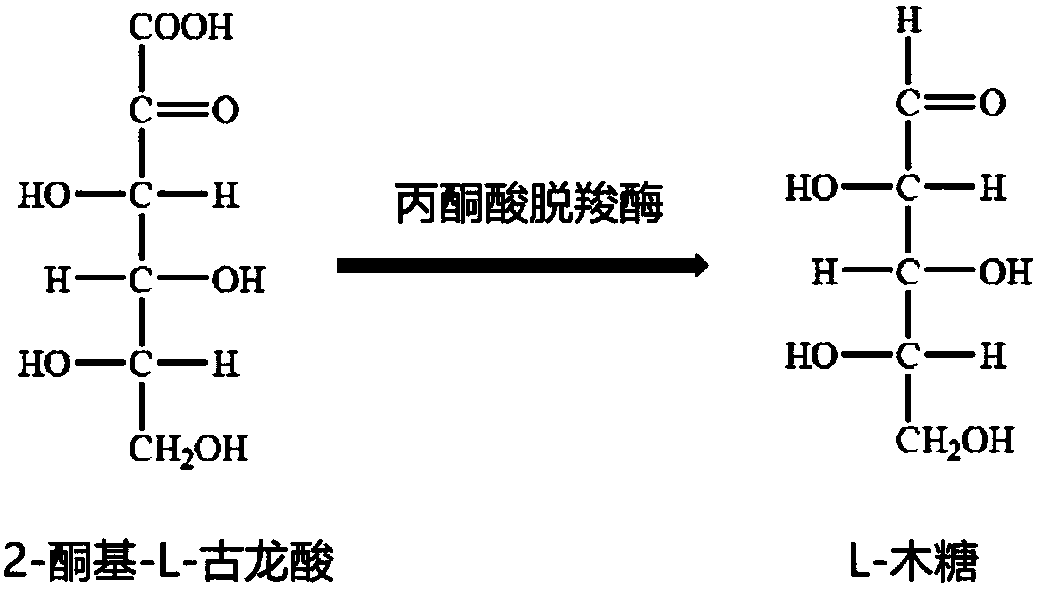Enzymatic method for preparing L-xylose
An enzymatic and xylose technology, applied in the field of enzymatic preparation of L-xylose, can solve the problems affecting the extraction process and product quality, unsuitable for L-xylose raw materials, low post-processing efficiency, etc., to achieve low pollution and easy operation Simple and easy to control, the effect of a single raw material
- Summary
- Abstract
- Description
- Claims
- Application Information
AI Technical Summary
Problems solved by technology
Method used
Image
Examples
Embodiment 1
[0022] (1) Preparation of pyruvate decarboxylase
[0023] Primers were designed according to the pyruvate decarboxylase gene sequence of Saccharomyces cerevisiae in Genebank, as follows:
[0024] Upstream primer: CATGCCATGGATTCAATTACTTTGGGTAAATATTTGTTCG
[0025] Downstream primer: CCGCTCGAGTTGCTTAGCGTTGGTAGCAGCAGTC
[0026] After the PCR product of pyruvate decarboxylase was inserted into the plasmid pET-22b, the recombinant expression plasmid pET-22b-pdc was constructed.
[0027] Take 0.01g of the recombinant expression plasmid pET-22b-pdc to transform Escherichia coli BL21(DE3) competent cells, culture in 600μL LB medium for 1h, take 100μL of the bacterial liquid and spread it on a solid LB plate containing ampicillin, at 37℃ Cultivate for 10 hours to obtain genetically engineered bacteria capable of highly expressing pyruvate decarboxylase.
[0028] The constructed engineered bacteria were inoculated in TB medium containing ampicillin, and cultured at 37°C until the bact...
Embodiment 2
[0032] Substantially the same as Example 1, the difference is that the buffer is an MES buffer, pH7.5, 5mM magnesium chloride, 1mM thiamine pyrophosphate and 300mM 2-keto-L-gulonic acid, and the conversion rate is similar to that of Example 1 Ratio, increased by 16.9%, that is, 28.0g / L L-xylose was generated.
Embodiment 3
[0034] Basically the same as Example 1, the difference is that the reaction temperature is 45 ° C, 5mM magnesium chloride, 1mM thiamine pyrophosphate, 300mM 2-keto-L-gulonic acid, and the conversion rate is compared with Example 1, which has increased by 24.5 %, that is, 31.4g / L L-xylose was generated.
PUM
 Login to View More
Login to View More Abstract
Description
Claims
Application Information
 Login to View More
Login to View More - R&D
- Intellectual Property
- Life Sciences
- Materials
- Tech Scout
- Unparalleled Data Quality
- Higher Quality Content
- 60% Fewer Hallucinations
Browse by: Latest US Patents, China's latest patents, Technical Efficacy Thesaurus, Application Domain, Technology Topic, Popular Technical Reports.
© 2025 PatSnap. All rights reserved.Legal|Privacy policy|Modern Slavery Act Transparency Statement|Sitemap|About US| Contact US: help@patsnap.com



